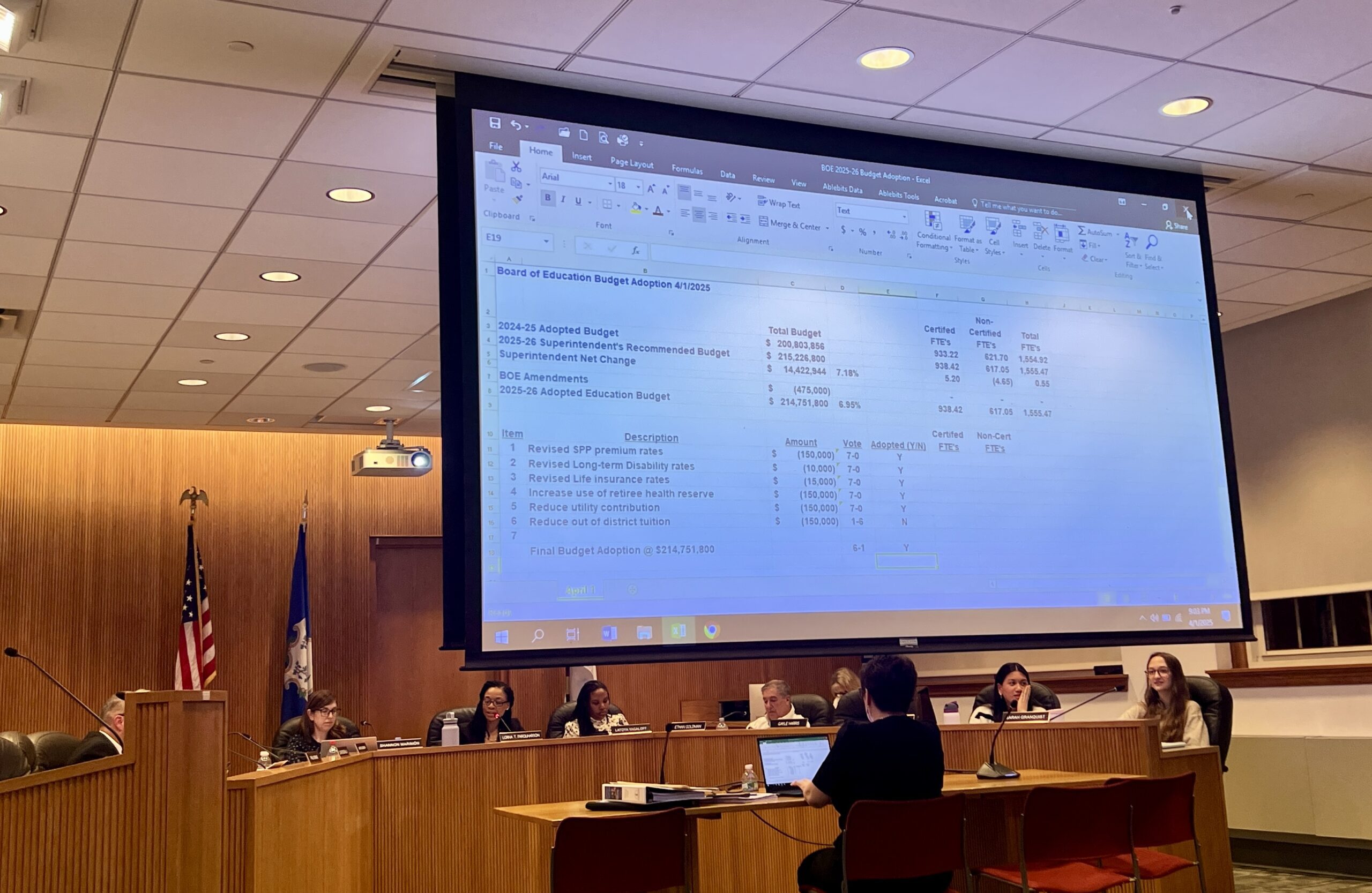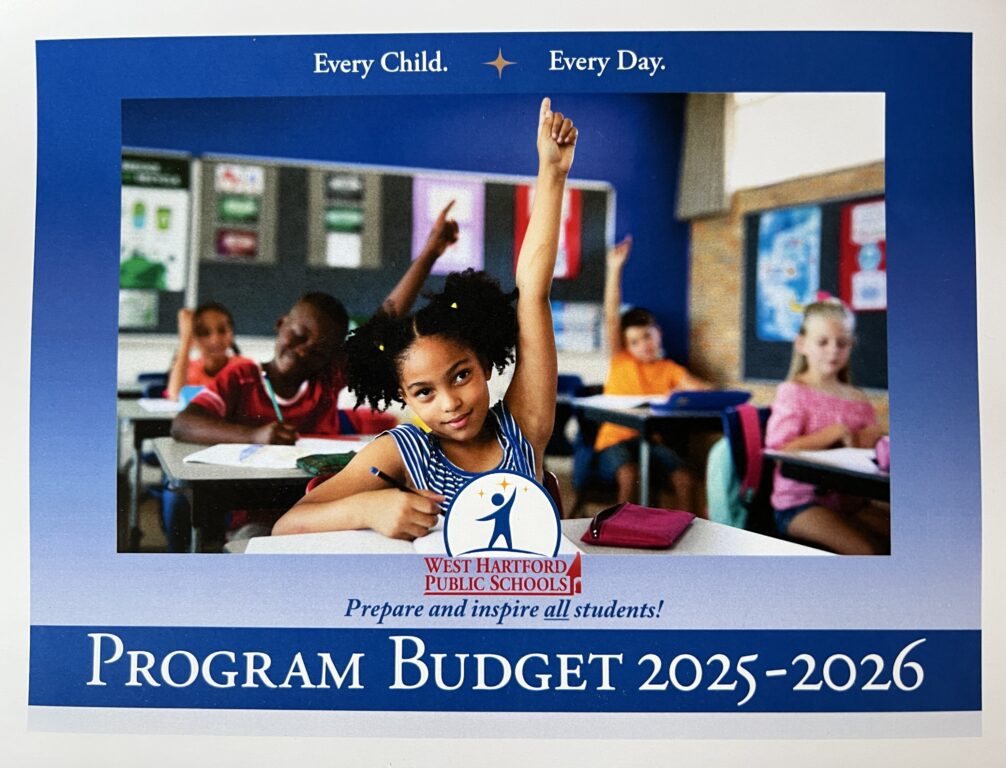West Hartford Board of Education Makes Adjustments, Approves Budget

Audio By Carbonatix

Director of Finance and Planning Liz Hewitt updates a spreadsheet as the Board of Education votes on amendments, and then the entire West Hartford Public Schools budget. Photo credit: Ronni Newton
The West Hartford Board of Education made some alterations to the original proposal by Superintendent Paul Vicinus before voting 6-1 to adopt the 2025-26 budget Tuesday night.
By Ronni Newton
The West Hartford Board of Education approved several expenditure reductions to the 2025-26 budget that had been proposed by Superintendent of Schools Paul Vicinus on March 4, and voted 6-1 Tuesday night to approve a $214,751,800 spending plan, an increase of 6.95% over the current $200,803,856 budget adopted for the 2024-25 academic year.
Republican Ethan Goldman cast the lone vote against the budget.
Vicinus praised the community for their participation in hearings and community conversations. “The support and the collaboration has been phenomenal,” he said, and in the four weeks since the presentation they continued to work on refinements.
Director of Finance and Planning Elizabeth Hewitt outlined several adjustments that, after each amendment received unanimous approval by the Board, trimmed $475,000 from the budget and modified the overall budget increase to 6.95%, down from the original proposed 7.2% increase.
Those adjustments were:
- A $150,000 reduction in the State Partnership Plan medical insurance cost because the actual premium rate increase was 9.9% rather than the initial projection of 10%.
- After a meeting with the insurance carriers for longterm disability and life insurance, they agreed to keep the rates flat. The LTD cost was reduced by $10,000, and the life insurance premium cost was reduced by $15,000.
- An additional $150,000 will be used from the retiree health reserve.
- The contribution to the utility services fund was reduced by $150,000 due to a likely virtual net metering credit.
Hewitt said Catherine Diviney, the town’s energy specialist “feels pretty confident” about the utility credit, and she is comfortable that there are adequate funds available in the retiree health reserve.

Courtesy of West Hartford Public Schools
Vicinus was asked to provide clarification about the two primary issues that have been raised by families at public hearings, in community conversations, and during the comment period before Board meetings – including on Tuesday night prior to the vote when four eighth grade Quest students from King Philip Middle School spoke about retaining the Quest program as a “quintessential” element of their educational experience, and Whiting Lane PTO liaison Shayna Quinn spoke against larger class sizes, noting that cutting elementary teaching positions could be seen as the “low-hanging fruit” but perhaps central office reductions should be considered instead, along with seeking greater efficiencies in special eduction.
“I was so inspired by the outpouring of support for our Quest program,” Vicinus said, but he believes there had been some misunderstanding about the messaging which he tried to clarify through an email to Quest families on March 19. The elimination of 0.7 positions from the Quest program in the proposed budget was to “trim some staffing in response to overall school-based enrollment that we’ve seen” he said Tuesday night, as well as in response to some scheduling efficiencies.
Regarding decreasing the amount of time each student has in Quest, Vicinus said “none of that is what is being considered.” In the middle schools there are “break points” where the group of Quest student in a section may be larger, but he said they will ensure the FTEs that are allocated are being used effectively “without negatives to our program.”
Regarding class sizes, Vicinus said, “I’m certainly not advocating for larger class sizes.” A projection in late February, which was used in the initial budget presentation and is posted online with the budget documents, indicated an overall 196 elementary sections, 193 of which had been allocated to school classrooms with three left over to deal with possible breaks that require additional sections.
When the projection was run again on March 26, taking into account updated information about move-ins and move-outs and including the impact of enrollment in magnet programs, some of the grades that were projected to have classes at their maximum guideline level had added a single student, leading to a break that resulted in another section and therefore smaller class sizes. “In that projection I do not take note of any class sizes that would be at 27,” he said, which is the class limit guideline for fourth and fifth grade. A few were at 26, and there were four sections left to be distributed “to the areas where we see the need.”
Because enrollment is a moving target, Vicinus said right now it’s just a snapshot, a moment in time, and the final distribution will not take place until closer to the start of the school year and will be done equitably among the schools. He noted that kindergarten remains the toughest to predict.
“We don’t strive to have the highest number per classroom,” Board Chair Lorna Thomas-Farquharson reiterated. Vicinus emphasized the variability with the estimates and changes that take place throughout the summer, and if sections need to be added they will, along with other support personnel.
Major drivers of the budget are salary increases that are part of negotiated collective bargaining agreements, benefit costs, contractual transportation costs, services for students with special needs including out-of-district placement, and inflation.
The shortfall in excess cost reimbursement from the state has been an issue under discussion between legislators and Gov. Ned Lamont, and while it has been addressed for the current fiscal year, and an extra $40 million is budgeted by the state for reimbursement to municipalities in FY27, the upcoming fiscal year has not been addressed. With rising costs for tuition and transportation for students who receive out-of-district services, Hewitt said the proposed bugdget estimates that the town will receive $6,000,000 in reimbursement from the state in FY26 depends on the overall claims against a fixed pool of state funds.
Goldman proposed increasing the estimated reimbursement from the state to $6,150,000 in order to reduce the cost to taxpayers, but other Board members were not comfortable with that, and the motion failed, 1-6.
Before casting their votes, each Board member expressed thanks to Vicinus and the rest of the district’s team for their work.
“Thank you for the countless hours, the hard work that goes into creating this budget, but also the care and compassion,” said Democrat Jason Gagnon. “I think that sometimes gets lost when we start talking about numbers, but you guys never lose focus and you never let us lose focus on the fact that these aren’t just numbers … there’s students, there’s families, there’s educators and staff behind these numbers, and that this budget has a very real impact on them.”
Gagnon added that he is proud that topics about which people care deeply have been able to be debated with respect and civility, resulting in a budget that “like any budget, is one of compromise” reflecting the fact that finances are not unlimited. The sunsetting of the ESSER (Elementary and Secondary School Emergency Relief grants awarded during the COVID-19 pandemic) brought to light areas of need not previously recognized, “as well as a really, really bright glimpse into what things could be with a fiscal surplus.” He did question the state maintaining a touted fiscal surplus at a time when education is not being fully funded in Connecticut.
“The failure to do so acts as a tax on the residents of West Hartford, who must shoulder that burden in the form of increased property taxes and the schools who are forced into making difficult choices about where and what to cut. The failure to fully fund special education is a failure to fund all education,” Gagnon said. The Board is a steward of the town’s educational system, and of the financial resources provided to support it, and not everyone in town is able to take on that burden, he said, adding,”The budget we have before us is not one of wants, but of needs.”
Gagnon said he hopes that the Town Council – which will vote on April 22 to appropriate funds for education as part of the general fund budget – “will recommit to the oft-repeated quote that if West Hartford had a state religion would be education.”
When Goldman spoke before the vote he said he was struggling with his decision, with approving an increase of 6.9% which is higher than inflation. He also noted that he appreciated the desire of parents for smaller class sizes and thinks the Board should take another look at its guidelines – which they said later in the meeting would be a future agenda topic for the policy committee.
Regarding the special education tuition, Goldman said, “I just think we need to look at that hard because that’s a 40% increase … and I don’t want to take anything away from what special needs needs, but that’s 25% of [the department’s] budget,” he said, which is a staggering amount and it’s not going to get better.
Republican Gayle Harris said since she has been on the Board the budget has increased by $40 million. “It’s just simply unsustainable,” she said, noting that the state is not funding their mandates putting the district “between a rock and a hard place.”
Most of what’s driving the budget, Harris said, can’t be controlled and there is is no help from the state. “There are definitely people in our town who can afford that, but there are definitely people who can’t. … We have to find a way to get this budget under control and I think we as a Board, we need to find some method or mechanism going forward that we can have better control over the budget.”
Harris said she was happy that Vicinus and Hewitt had found some reductions, and said that while it’s not exactly the budget she wants, she would support it.
“I truly believe that all of us, including the school district, the administration, our superintendent, and our Board of education colleagues have a north star of ensuring that we maintain essential programs that serve all students, upholding the district’s high standards,” Democrat and Vice Chair Shannon Marimón said. She said she supports the budget as making “prudent financial decisions without compromising the excellence that defines West Hartford’s educational experience.”
Marimón said the Board has asked many questions about class sizes and Quest and is confident of the administration’s plans and judgment. She also said it’s important to keep advocating, working with the state delegation, to receive support for statutory mandates.
Democrat Clare Taylor Neseralla said the superintendent presented a “lean budget … but it’s still close to a $14 million increase,” which is double the percentage of last year. “I believe there is a limit to how much we can ask residents to pay in increased taxes,” she said, but is hopeful the Town Council will appropriate the funds to support this budget and not ask the Board to go back and make further cuts.
Neseralla said she is also concerned about the state’s reliance on federal funds, and the impact of the dissolution of the Department of Education.
And while she agrees that smaller class sizes are ideal, “I believe the proposed cuts will not have a negative effect on the quality of education our students receive.”
Democrat LaToya Yagaloff said she was going to say some things that were “uncomfy, and I am uncomfy saying them.” She said she knows what it’s like – including in this state – as a student, and as an educator, to have a disengaged superintendent, unsafe schools, and low quality education. She said that as a Black woman and a Black parent in this district she provides a different perspective and “sometimes you don’t know how good you have it when you’ve never really had it that bad, and I’m not saying that to diminish anything.”
Yagaloff said she thinks it’s important to redirect some of the energy and advocacy “to be allies and speak for those communities who have been systemically marginalized and who live right here in our town.” There are communities in the state and country that have not been getting what they need for years, “and I think maybe one of the most hopeful things I’m seeing right now is that some of the people who’ve been in a bubble of privilege are now starting to feel a little bit of that tension and it’s causing a stirring, and I love the stirring, but I want us to be cognizant of the kids and the families right now that are waking up in our district every day not knowing if it’s gonna be safe for them …”
Thomas-Farquharson, like the other Board members, shared her thanks to Vicinus and the rest of the team, and also to the mayor, Town Manager, and Town Council for initiating the listening sessions held in March which allowed for reciprocal engagement in a public-facing way. “As you know with public hearings, it’s just one way … whereas with these three separate listening sessions we had it did allow for an opportunity for comments to be made and for us to respond.”
The Board’s budget is 60% of the town’s budget – although just 30% of residents have children in the schools, she said, and the combined session allowed a greater chance for all to appreciate that it involves “all hands on deck” to develop the budget.
“I appreciate all that my colleagues have shared and certainly recognize the importance that these numbers relate to people, and they relate to human beings …” Thomas-Farquharson said, and the concerns about class size are not taken lightly. She expressed her thanks to the legislative delegation for their advocacy, and said it needs to continue.
“Our district is comprised of many students of different abilities, of different backgrounds, of different languages, and we love them all. We love them all and we prioritize all of them,” she said. This budget may not be what we want, but it “reflects what we need” for the children.
More information about the 2025-26 budget, including details about the drivers and historical data, can be found here.
While the Board of Education decides what to spend, it is ultimately up to the Town Council to allocate the funding. The Council, however, cannot alter specific line items but only the overall district budget. The Town Council plans to adopt the overall general fund budget on Tuesday, April 22, with the meeting beginning at 7:30 p.m.
Like what you see here? Click here to subscribe to We-Ha’s newsletter so you’ll always be in the know about what’s happening in West Hartford! Click the blue button below to become a supporter of We-Ha.com and our efforts to continue producing quality journalism.



